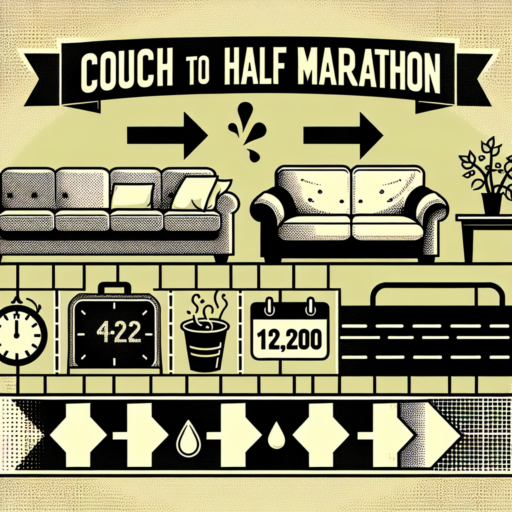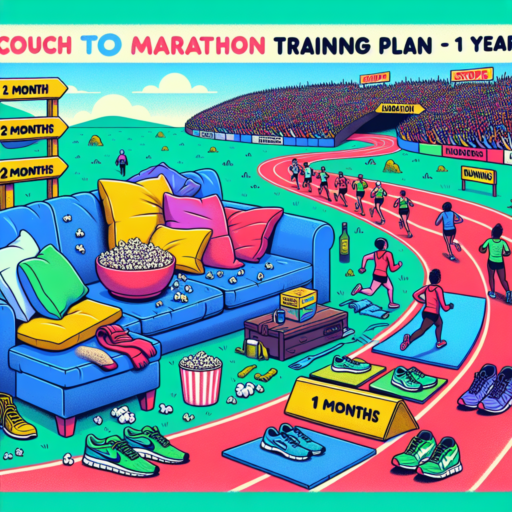How long do you need from couch to half marathon?
The journey from couch to half marathon is a transformative one, requiring dedication, motivation, and a well-structured training plan. Typically, a novice runner should plan for 12 to 20 weeks of consistent training to prepare for a half marathon. This timeframe allows for gradual increase in mileage, helping to avoid injury and build both endurance and speed.
Key Components of Training
- Building a Base: The first 4-6 weeks focus on slowly building up weekly mileage, with emphasis on comfortable, easy-paced runs.
- Incorporating Interval Training: After building a base, introduce interval training one day a week to improve aerobic capacity.
- Long Runs: Gradually increase the length of the longest weekly run, reaching at least 10-12 miles before race day.
While the exact duration can vary based on your starting fitness level, commitment to your training plan, and your personal goals, these guidelines offer a foundation upon which to build a successful half marathon experience. Remember, the process is as much about the journey as it is about the finish line. Listen to your body, adjust your training as necessary, and embrace the transformative power of running.
How long does it take to go from out of shape to half marathon?
Training for a half marathon from a point of being out of shape is a journey that varies greatly from person to person, depending on several factors including starting fitness level, consistency in training, and individual health conditions. Generally, it is recommended to allow yourself anywhere from 12 to 20 weeks of dedicated training to prepare for a half marathon if you’re starting from scratch.
Factors Influencing Your Training Timeline
The time it takes to go from out of shape to ready for a half marathon is influenced by your base fitness level. Those with a bit of running experience or who are already active may find it easier to ramp up their mileage more quickly than complete beginners. Additionally, your ability to stick to a consistent training schedule plays a critical role. Life commitments, job constraints, and unexpected injuries can all extend the time needed to prepare.
Customizing Your Training Plan is essential. No single plan fits everyone, so adapting your schedule to accommodate your life and physical readiness is key. Incorporating rest days, cross-training, and gradually increasing your running distance week by week are strategies that help reduce injury risk and improve endurance. Listen to your body and adjust as necessary, as pushing too hard too soon can lead to setbacks.
Remember, the journey from starting line to finish line is unique for every individual. Whether it takes 12 weeks or 20, the goal is reaching the starting line of the half marathon healthy, prepared, and confident in your ability to complete the race.
No se han encontrado productos.
Can I go from couch to half marathon in 12 weeks?
Embarking on the journey from being a couch potato to running a half marathon in just 12 weeks is a challenge that many aspire to conquer. This ambitious goal prompts the question of not just feasibility but also the best strategies for achieving such a fitness milestone. Preparing for a 21-kilometer run demands a combination of dedication, proper training, and a strategic approach to physical conditioning.
Building a Foundation: The initial weeks should focus on creating a habit of regular exercise. For those starting from a low fitness level, this phase is crucial for gradually increasing stamina and avoiding injuries. Incorporating a mix of running, walking, and strength exercises ensures a balanced foundation for the more intense training ahead.
Incremental Increases: A core principle of preparing for a half marathon in such a short timeframe is the systematic increase in running distance. Each week, aspiring runners should aim to extend their longest run by approximately 10%, allowing the body to adapt to the increasing demands without overwhelming it. Alongside increasing distance, incorporating rest days and cross-training activities enhances recovery and overall fitness.
How many rest days before a half marathon?
Preparing for a half marathon involves thoughtful consideration regarding your rest days to ensure you are at your peak performance on race day. The optimal amount of rest varies among runners, but a general guideline suggests that taking one to three days of reduced activity or complete rest is beneficial before tackling the 13.1 miles. Understanding your body’s needs and how it recovers can influence how you taper your training and integrate rest days into your regimen.
During the final week leading up to a half marathon, your training load should decrease. This process, known as tapering, helps the body repair and strengthen, making you stronger on race day. Most coaches recommend significantly reducing mileage but keeping a small number of short, easy runs or even some light cross-training sessions in the days leading up to the race. This approach maintains your fitness level without overly taxing your body.
The concept of ‘rest’ does not necessarily mean complete inactivity. For some, a rest day might include activities such as stretching, yoga, or a leisurely walk. These activities can promote blood flow, aiding in recovery while keeping the muscles engaged. The key is to avoid strenuous activity that could detract from your performance during the half marathon. Incorporating proper nutrition and hydration during your rest days also plays a crucial role in ensuring you’re fully prepared and energized for your event.




